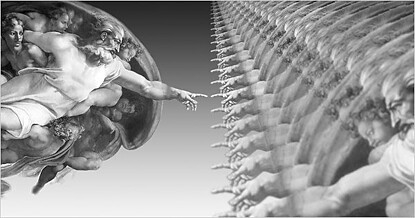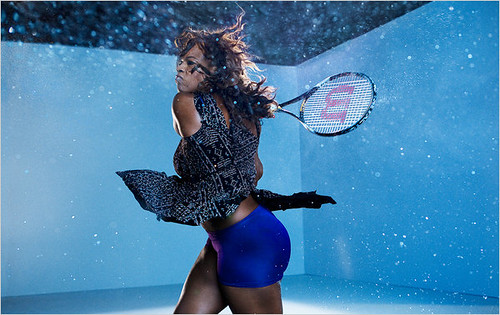 NY Times op-ed illustration by Ji Lee
NY Times op-ed illustration by Ji LeeWe're all familiar with the well-worn science fiction trope: Humans build a vast network of powerful machines; the machines become sentient & take over the world. Software designer Jaron Lanier doesn't necessarily believe this story, but he thinks it's important. In a recent
NY Times op-ed, "The First Church of Robotics," Lanier argues that this machine-mind creation myth is fast gaining currency in our culture as a real -- not sci fi -- near-future event. At the well-heeled & well-connected
Singularity University, for example, many of Silicon Valley's technological elite expect that "one day... the Internet will suddenly coalesce into a super-intelligent A.I. (Artificial Intelligence), infinitely smarter than any of us individually and all of us combined." In fact "...these are guiding principles, not just amusements, for many of the most influential technologists," Lanier reports.
Crazy? Who knows. Meanwhile, let's talk about the present. For good or ill, A.I. is seen right now as a new kind of god. I think the idea thrills us. Even if our new god turns out to be cruel (witness the recent explosion of literary & cinematic dystopias), we are ready. Perhaps we welcome AI because we can't help loving our own intelligence. Encoded within the AI, our small isolated stores of knowledge -- our data -- may become part of something much greater. The AI needs us. Thus, the master machines share our humanity & give us immortality.
"What we are seeing is a new religion , expressed through an engineering culture," says Lanier.
What's interesting is that Lanier makes this provocative point as an unreconstructed engineer & Silicon Valley insider. When he says that IBM -- which recently unveiled a question-answering computer designed to play the TV game show
'Jeopardy' -- could have "...dispensed with the theatrics [and] declared it had done Google one better and come up with a new phrase-based search engine," he clearly knows what he's talking about.
Not that we don't all understand why IBM listened to its ad people. Just a search engine? How boring. Why not a talking machine, a smart robot, something like a ... person? Think R2D2. Think WALL-E. Let's face it, there's something irresistible about those little mannikins. Even their old neurotic granddad, HAL, felt like part of the family. What's not to like?
Lanier warns that our identification with our technology is "allowing artificial intelligence to reshape our concept of personhood... we think of people more & more as computers, just as we think of computers as people...The very idea of A.I. gives us the cover to avoid accountability by pretending that machines can take on more and more human responsibility," Lanier says.
What a bummer this guy is! He's no fun at all. But, hold on, his suggestions of what to do about the fatal attraction of man & machine aren't really radical. For example, listen to his comment about the recommendation software on Netflix or Pandora: "Seeing movies or listening to music suggested to us by algorithims is relatively harmless, I suppose. But I hope that once in a while the users of those services resist the recommendations; our exposure to art shouldn't be hemmed in by an algorithim that we merely want to believe predicts our tastes accurately. These algorithims do not represent emotion or meaning, only statistics & correlations."
Spoken like an engineer. Factual. Unembellished. This is the way Lanier thinks we should look at our technology. What he's warning against is the way artists (& clergy) -- who typically know next to nothing technically -- look at it. They make up stories, invent metaphors, assign meanings. It's not very likely, after all, that a true scientist will fall in love with his iPhone. He may find it useful; he may admire it. But he is not likely to adore a mere tool. It's the artist who is smitten, who praises his iPhone every day, who thanks it for its loyalty & brilliance, who regards it as his secretary, amanuensis, his dear little friend.
"Technology is essentially a form of service," Lanier counters. "We work to make the world better. Our inventions can ease burdens, reduce poverty & suffering, and sometimes even bring new forms of beauty into the world. We can give people more options to act morally because people with medicine, housing and agriculture can more easily afford to be kind than those who are cold, sick and starving... But civility, human improvement, these are still choices. That's why scientists & engineers should present technology in ways that don't confound those choices."
And finally: "When we think of computers as inert, passive tools instead of people, we are rewarded with a clearer, less ideological view of what is going on -- with the machines and with ourselves."










